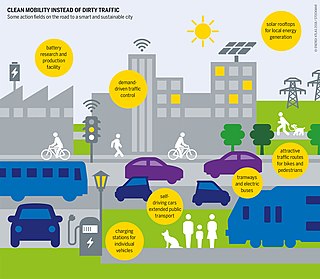Related Research Articles

The United Nations Environment Programme (UNEP) is responsible for coordinating responses to environmental issues within the United Nations system. It was established by Maurice Strong, its first director, after the United Nations Conference on the Human Environment in Stockholm in June 1972. Its mandate is to provide leadership, deliver science and develop solutions on a wide range of issues, including climate change, the management of marine and terrestrial ecosystems, and green economic development. The organization also develops international environmental agreements; publishes and promotes environmental science and helps national governments achieve environmental targets.

A fossil fuel is a hydrocarbon-containing material such as coal, oil, and natural gas, formed naturally in the Earth's crust from the remains of dead plants and animals that is extracted and burned as a fuel. Fossil fuels may be burned to provide heat for use directly, to power engines, or to generate electricity. Some fossil fuels are refined into derivatives such as kerosene, gasoline and propane before burning. The origin of fossil fuels is the anaerobic decomposition of buried dead organisms, containing organic molecules created by photosynthesis. The conversion from these materials to high-carbon fossil fuels typically require a geological process of millions of years.

Greenwashing, also called green sheen, is a form of advertising or marketing spin in which green PR and green marketing are deceptively used to persuade the public that an organization's products, aims, and policies are environmentally friendly. Companies that intentionally take up greenwashing communication strategies often do so to distance themselves from their environmental lapses or those of their suppliers.

Sustainable transport refers to ways of transportation that are sustainable in terms of their social and environmental impacts. Components for evaluating sustainability include the particular vehicles used for road, water or air transport; the source of energy; and the infrastructure used to accommodate the transport. Transport operations and logistics as well as transit-oriented development are also involved in evaluation. Transportation sustainability is largely being measured by transportation system effectiveness and efficiency as well as the environmental and climate impacts of the system. Transport systems have significant impacts on the environment, accounting for between 20% and 25% of world energy consumption and carbon dioxide emissions. The majority of the emissions, almost 97%, came from direct burning of fossil fuels. In 2019, about 95% of the fuel came from fossil sources. The main source of greenhouse gas emissions in the European Union is transportation. In 2019 it contributes to about 31% of global emissions and 24% of emissions in the EU. In addition, up to the COVID-19 pandemic, emissions have only increased in this one sector. Greenhouse gas emissions from transport are increasing at a faster rate than any other energy using sector. Road transport is also a major contributor to local air pollution and smog.

Green building refers to both a structure and the application of processes that are environmentally responsible and resource-efficient throughout a building's life-cycle: from planning to design, construction, operation, maintenance, renovation, and demolition. This requires close cooperation of the contractor, the architects, the engineers, and the client at all project stages. The Green Building practice expands and complements the classical building design concerns of economy, utility, durability, and comfort. Green building also refers to saving resources to the maximum extent, including energy saving, land saving, water saving, material saving, etc., during the whole life cycle of the building, protecting the environment and reducing pollution, providing people with healthy, comfortable and efficient use of space, and being in harmony with nature. Buildings that live in harmony; green building technology focuses on low consumption, high efficiency, economy, environmental protection, integration and optimization.’

A sustainable city, eco-city, or green city is a city designed with consideration for social, economic, environmental impact, and resilient habitat for existing populations, without compromising the ability of future generations to experience the same. The UN Sustainable Development Goal 11 defines sustainable cities as those that are dedicated to achieving green sustainability, social sustainability and economic sustainability. They are committed to doing so by enabling opportunities for all through a design focused on inclusivity as well as maintaining a sustainable economic growth. The focus will also includes minimizing required inputs of energy, water, and food, and drastically reducing waste, output of heat, air pollution – CO2, methane, and water pollution. Richard Register, a visual artist, first coined the term ecocity in his 1987 book Ecocity Berkeley: Building Cities for a Healthy Future, where he offers innovative city planning solutions that would work anywhere. Other leading figures who envisioned sustainable cities are architect Paul F Downton, who later founded the company Ecopolis Pty Ltd, as well as authors Timothy Beatley and Steffen Lehmann, who have written extensively on the subject. The field of industrial ecology is sometimes used in planning these cities.

Environmentalism has been a theme and cultural trend in popular music. Ecomusicologists and music educators are increasingly emphasizing the intersections of music and nature, and the role of music in ecological activism.

Greentech Media, also known as GTM, was a media company based in Massachusetts, United States, that generated online daily reports, market research studies, and news on green technology and green jobs.
Greenpeace USA is the United States affiliate of Greenpeace International, an environmental nonprofit organization that spawned a social movement inspired by direct actions on the high seas to stop whaling and nuclear testing. Headquartered in Washington D.C., Greenpeace U.S.A. operates with an annual budget of approximately $40 million, employing over 500 people in 2020. The organization relies on donations from members, refuses corporate contributions and refrains from endorsing political candidates, though in 2020 Greenpeace USA issued climate scorecards for presidential candidates and ranked them from best to worst on climate

The environmental effects of transport are significant because transport is a major user of energy, and burns most of the world's petroleum. This creates air pollution, including nitrous oxides and particulates, and is a significant contributor to global warming through emission of carbon dioxide. Within the transport sector, road transport is the largest contributor to global warming.
A Green bond is a fixed-income financial instruments (bond) which is used to fund projects that have positive environmental and/or climate benefits. They follow the Green Bond Principles stated by the International Capital Market Association (ICMA), and the proceeds from the issuance of which are to be used for the pre-specified types of projects.

Individual action on climate change can include personal choices in many areas, such as diet, travel, household energy use, consumption of goods and services, and family size. Individuals can also engage in local and political advocacy around issues of climate change. People who wish to reduce their carbon footprint, can take "high-impact" actions, such as avoiding frequent flying and petrol fuelled cars, eating mainly a plant-based diet, having fewer children, using clothes and electrical products for longer, and electrifying homes. Avoiding meat and dairy foods has been called "the single biggest way" an individual can reduce their environmental impact. Excessive consumption is more to blame for climate change than population increase. High consumption lifestyles have a greater environmental impact, with the richest 10% of people emitting about half the total lifestyle emissions.
Green Schools Alliance (GSA) is an effort by primary and secondary schools worldwide to address climate change and conservation challenges by creating a peer-to-peer network of school members committed to reducing their greenhouse gas emissions and accelerating the implementation of sustainable solutions.

Ayana Elizabeth Johnson is a marine biologist, policy expert, and conservation strategist. She is the co-founder of Urban Ocean Lab, a think tank for ocean-climate policy in coastal cities, and the Roux Distinguished Scholar at Bowdoin College.

The European Green Deal, approved in 2020, is a set of policy initiatives by the European Commission with the overarching aim of making the European Union (EU) climate neutral in 2050. The plan is to review each existing law on its climate merits, and also introduce new legislation on the circular economy, building renovation, biodiversity, farming and innovation.

Jerome Foster II is an American environmental activist. He is the youngest-ever White House Advisor in United States history, as a member of the White House Environmental Justice Advisory Council within the Biden administration. Foster is a leading voice for marginalized and working class communities in spaces pushing for social, economic and environmental justice. Foster is one of the major organizers of Fridays for Future; holding weekly climate strikes at the front gates of the White House for over 57 weeks. He has previously served as a congressional intern for U.S. Representative John Lewis at the age of 16 and served on the Washington DC State Board of Education's Advisory Council at the age of 14.

The COVID-19 pandemic has had an impact on the environment, with changes in human activity leading to temporary changes in air pollution, greenhouse gas emissions and water quality. As the pandemic became a global health crisis in early 2020, various national responses including lockdowns and travel restrictions caused substantial disruption to society, travel, energy usage and economic activity, sometimes referred to as the "anthropause". As public health measures were lifted later in the pandemic, its impact has sometimes been discussed in terms of effects on implementing renewable energy transition and climate change mitigation.
Green recovery packages are proposed environmental, regulatory, and fiscal reforms to rebuild prosperity in the wake of an economic crisis, such as the COVID-19 pandemic or the Global Financial Crisis (GFC). They pertain to fiscal measures that intend to recover economic growth while also positively benefitting the environment, including measures for renewable energy, efficient energy use, nature-based solutions, sustainable transport, green innovation and green jobs, amongst others.

Grouse is an eight part podcast hosted by Ashley Ahearn and produced by BirdNote and Boise State Public Radio. In each episode Ahearn spends about twenty minutes discussing the greater sage-grouse and various threats to the bird's population.
References
- ↑ "3 New Environmental Podcasts You'll Want to Binge". Outside Online. 2020-11-11. Archived from the original on 2021-11-15. Retrieved 2021-11-15.
- 1 2 "Podcast ECO CHIC Cloud 10 and iHeartPodcasts". Outside Online. 2022-10-22. Retrieved 2022-10-22.
- 1 2 3 "Top 7 environmental and pollution podcasts". www.skymetweather.com. 2021-08-20. Archived from the original on 2021-11-15. Retrieved 2021-11-15.
- 1 2 3 "6 Hard-Hitting Environmental Podcasts • The Revelator". The Revelator. 2017-06-06. Archived from the original on 2021-11-15. Retrieved 2021-11-15.
- 1 2 "These Environmental Podcasts Are Scary as Sh—t". Outside Online. 2019-04-03. Archived from the original on 2021-11-15. Retrieved 2021-11-15.
- ↑ "Eau, air, terre : cinq podcasts sur la pollution tous azimuts". Télérama (in French). 2018-01-11. Archived from the original on 2021-11-15. Retrieved 2021-11-15.
- 1 2 3 Staff, Greener Ideal (7 May 2021). "12 Environmental Podcasts to Listen to in 2021". greenerideal.com. Archived from the original on 2021-11-15. Retrieved 2021-11-15.
- 1 2 "Movies, Podcasts and Books to Educate Yourself on Climate Change, Sustainability and the Hunger Crisis". Elle Canada. Archived from the original on 2021-11-15. Retrieved 2021-11-15.
- ↑ "Australians are making podcasts about climate change and Bigfoot — and they're earning thousands of dollars in subscriptions every month". Business Insider Australia. 2020-11-23. Archived from the original on 2021-11-15. Retrieved 2021-11-15.
- 1 2 3 "The 10 Best Sustainability Podcasts You Need To Listen To Now". Green Queen. 2020-10-05. Archived from the original on 2021-11-15. Retrieved 2021-11-15.
- 1 2 3 "13 sustainability podcasts that will keep your earbuds plugged in | Greenbiz". www.greenbiz.com. Archived from the original on 2022-01-15. Retrieved 2021-11-15.
- 1 2 3 "7 exceptional sustainability podcasts you should tune in to | Greenbiz". www.greenbiz.com. Archived from the original on 2021-11-15. Retrieved 2021-11-15.
- 1 2 3 "Pod's green earth: 14 sustainability podcasts you need to know | Greenbiz". www.greenbiz.com. Archived from the original on 2021-11-15. Retrieved 2021-11-15.
- 1 2 3 "Here Are the Top 10 Climate Change Podcasts Out Right Now". Gizmodo. 17 October 2020. Archived from the original on 2022-04-18. Retrieved 2021-11-15.
- 1 2 3 "5 Climate Change Podcasts You Should Be Listening to Right Now". Study Breaks. 2021-05-19. Archived from the original on 2021-11-15. Retrieved 2021-11-15.
- 1 2 "8 Genuinely Great Podcasts on Climate Change and the Natural World". Global Citizen. 5 March 2021. Archived from the original on 2021-10-08. Retrieved 2021-11-15.
- 1 2 3 Lett, Phoebe (2021-04-18). "Listen to a Changing Planet, Through These 5 Climate Podcasts". The New York Times. ISSN 0362-4331. Archived from the original on 2021-11-15. Retrieved 2021-11-15.
- 1 2 3 "8 Podcasts About Climate Change That Can Help You Remain Informed". Bustle. 23 April 2019. Archived from the original on 2021-11-15. Retrieved 2021-11-15.
